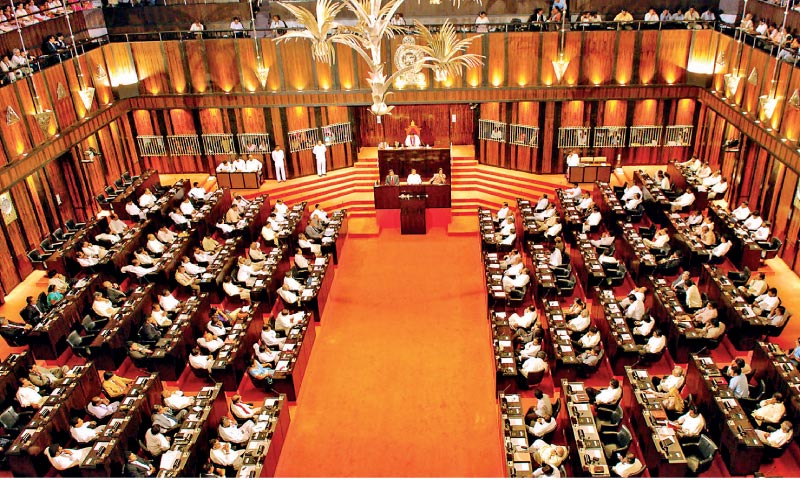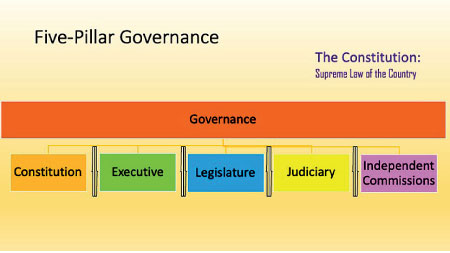Friday Feb 13, 2026
Friday Feb 13, 2026
Thursday, 16 May 2024 00:00 - - {{hitsCtrl.values.hits}}

A supreme and inviolable Constitution represents the people’s sovereignty and provides strong and enforceable structures and laws
By Lacille de Silva, Rohan Prithiviraj Perera, Bernard Fernando, Ranjan de Silva, Geewananda Gunawardana, Leonard Pinto, and Chula Goonasekera
 Background
Background
Sri Lanka stands at a pivotal juncture amidst political tumult, plagued by past mismanagement resulting from a Constitution tainted by manipulation from politicians, including a defective electoral system. Traditional political reforms have failed, necessitating constitutional reform guided by transparency and accountability. Only a public referendum can offer hope for substantive change to resist potential tyranny from proposed reforms pushed through by parliamentary majorities comprising only politicians. It is therefore important to restore true democratic ideals and reclaim self-governance through the people’s collective will, for the people, and by the people. At such a crucial and decisive juncture, following 76 years of misrule after independence, a “systems change” becomes imperative if our motherland is to move forward on the path of sustainable development. There is no other way.
How can ordinary citizens do this?
Citizens must unite to reclaim governance amidst economic volatility and debt. This involves fortifying the electoral system for regional representation and equal voting rights and championing constitutional reform through a public referendum to eliminate political manipulations. Establishing a new, impartial legislature is crucial to restoring Sri Lanka’s democratic integrity. The vision includes five pillars of governance:
The key to dismantling corruption lies in a united front at the upcoming election, committed to constitutional changes and electoral system revisions, ensuring equality of choice and vote and regional representation. This will lead to a balanced parliament and independent governance, positioning Sri Lanka as a non-aligned nation ready for global challenges.
The five-pillar governance structure
The new five-pillar governance structure aims for comprehensive Structural and Legislative Reforms to ensure robust enforcement of systems and foster Public Accountability and Transparency. Justice and Equality are prioritised to eradicate discrimination and protect human rights while balancing individual liberties with National Security imperatives to ensure equity in justice for all. The primary objective is enhancing public welfare, fostering unity, and ensuring sustainable resource use rooted in integrity, accountability, and justice. Citizens shall be empowered as proactive contributors and vigilant guardians of democracy, ensuring transparency, accountability, and integrity in decision-making processes.
Constitution – supreme law
The Constitution is the supreme authority, safeguarding the rights and autonomy of the people, institutions, and the environment. It shall uphold the security of the nation, the rights, freedoms, and equality of all citizens before the law, promote transparency and accountability, foster justice, peace, and harmony to ensure the sovereignty of the people, and enforce the Doctrine of Public Trust expected from the elected representatives, who are temporary custodians of the country’s assets.
Legislature
The legislature plays a central role in shaping laws and representing the people’s voice, encompassing key functions such as law-making, representation, and oversight. It must operate independently and uphold ethical standards, strictly enforcing a code of conduct. Establishing an Upper House (The Senate) provides checks against potential dictatorial tendencies and enhances oversight without additional costs. The Senate shall consist of 29 members, with 18 nominated by provincial councils (2 from each through a transparent, meritocratic process) and 11 selected for their expertise.
An Independent Constitutional Council, comprising a majority of civil professionals, ensures transparency in Senate appointments. The Senate scrutinises legislation, oversees budgets, and provides checks and balances. Members serve four-year terms, with one of the Vice Presidents appointed by a majority vote of the 29 Senate members as its Chairperson. The Chairman holds no voting rights. The Senate’s authority includes scrutiny of legislation, budget oversight, and constitutional amendments, thus strengthening governance and upholding the rule of law.
Judiciary
The judiciary is vital for upholding the balance of power and ensuring the rule of law. It must maintain independence, accountability, and transparency. Quality assurance processes, ethical standards, and clear definitions of contempt of court are indispensable. Appointments, including those of the Chief Justice and Attorney General, should undergo a meritocratic process by the Judicial Services Commission, ratified by the Independent Constitutional Council comprising a majority of Civil Society Professionals, ensuring transparency and preventing interference or undue influences in the administration of justice. The chief prosecutor’s office must also remain independent from the Attorney General’s office.
Executive
The current Executive Presidency model has failed to safeguard democracy due to unprecedented powers that encourage dictatorial tendencies and shortsighted decisions, leading to widespread corruption and bankruptcy. It must be abolished with public consensus during a referendum and replaced by a non-executive president selected through an open call and meritocratic process prioritising character, performance, integrity, and past indicators, subject to rigorous checks. Its executive authority should be balanced by constitutional guarantees of fundamental rights and oversight by an independent judiciary.
Implementing a Non-Executive Presidency model with nine Vice Presidents selected based on strict meritocratic criteria within the provinces can ensure democratic principles and the rule of law to guide executive authority, fostering accountability and balance. Transitioning to this model would involve limiting the President’s duties to summoning parliament and appointing the Prime Minister, with oversight by the Legislative Assembly and the Constitutional Council. The armed forces would remain under the President’s command, subject to council approval.
The Prime Minister would be appointed based on majority support from elected parliament members after a General Election, with a cabinet of ministers comprising a maximum of 15 carefully aligned ministries for efficiency, appointed based on merit and subject to parliamentary ratification, promoting transparency and cross-party collaboration for effective governance. This structure aims to ensure stability, representation across regions, and clear protocols for presidential succession.
The independent commissions
Establishing independent oversight commissions appointed by a representative Constitutional Council strengthens the governance framework by upholding the Constitution and regulations while enhancing service delivery. These commissions, comprising professionals from diverse fields, operate autonomously but remain accountable to legal frameworks. Senate oversight ensures their performance and accountability.
Commissions, sanctioned by the Constitutional Council, consist of ex-officio members selected through a meritocratic process, ensuring expertise and independence. They oversee compliance with rules and regulations, promote transparency, and protect citizens’ rights. Key commissions include planning, judiciary, public services, elections, anti-corruption, education, health, economy, environment, and quality assurance.
This comprehensive framework spans essential sectors, enhancing accountability and transparency and bolstering democratic processes. Parliamentary scrutiny ensures independence from the executive while maintaining accountability. Ongoing public involvement and leadership dedication are crucial for upholding democratic principles and pursuing legislative alterations for the nation’s welfare.
Reforms also include provisions for the Office of the President and vice Presidents, Constitutional Adherence, and Presidential Succession, reinforcing public trust and professionalism in governance.
Concluding remarks
A five-pillar governance framework is essential for upholding State integrity, ensuring democracy, transparency, and good governance. It makes deviation from a constitution ratified by a public referendum difficult. These pillars, prioritising peace, harmony, law and order, economic prosperity, and environmental sustainability, provide a solid foundation for effective governance and systemic change. They guide policymaking towards achieving national development goals, fostering a brighter future for all citizens with a collective commitment to uphold these principles.
(Written on behalf of the LEADS forum; www.srilankaleads.com, email: [email protected].)